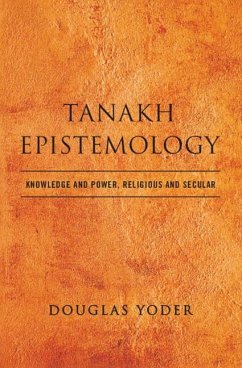In this volume, Douglas Yoder uses the tools of modern and postmodern philosophy and biblical criticism to elucidate the epistemology of the Tanakh, the collection of writings that comprise the Hebrew Bible. Despite the conceptual sophistication of the Tanakh, its epistemology has been overlooked in both religious and secular hermeneutics. The concept of revelation, the genre of apocalypse, and critiques of ideology and theory are all found within or derive from epistemic texts of the Tanakh. Yoder examines how philosophers such as Spinoza, Hume, and Kant interacted with such matters. He also explores how the motifs of writing, reading, interpretation, image, and animals, topics that figure prominently in the work of Derrida, Foucault, and Nietzsche, appear also in the Tanakh. An understanding of Tanakh epistemology, he concludes, can lead to new appraisals of religious and secular life throughout the modern world.
Dieser Download kann aus rechtlichen Gründen nur mit Rechnungsadresse in A, B, BG, CY, CZ, D, DK, EW, E, FIN, F, GR, HR, H, IRL, I, LT, L, LR, M, NL, PL, P, R, S, SLO, SK ausgeliefert werden.


